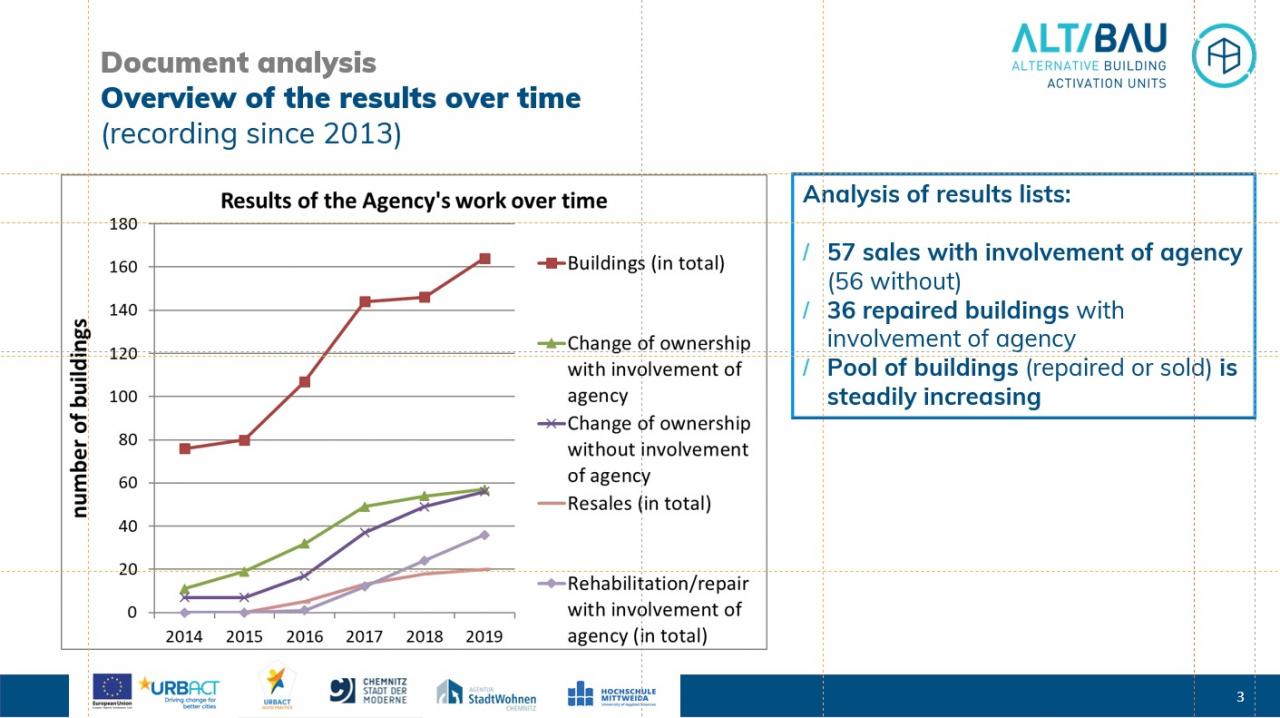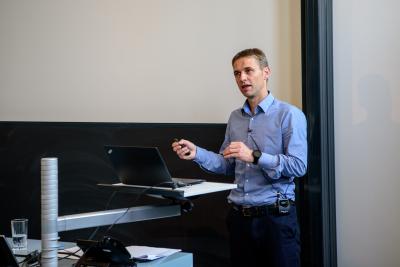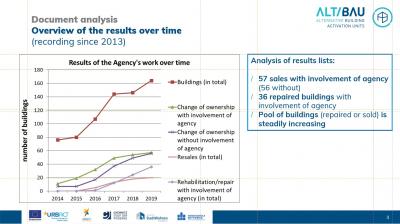
As a lead partner and official URBACT Good Practice in the URBACT Transfernetwork ALT/BAU, Chemnitz was not like the other six partner cities initially faced with the question of how the working methods of a good practice could be transferred and adapted to another city. Nevertheless the city of Chemnitz also expected to gain knowledge from the URBACT network and pondered how this could be achieved.
An idea is born
In the first meeting of the ULG, the idea arose to evaluate the work of the Good Practice and to identify potential for improvement. An external expert, Prof. Dr.-Ing. Jan Schaaf (photo below), was engaged through the programe with the evaluation. Prof. Dr.-Ing. Jan Schaaf is a lecturer at the University of Applied Sciences Mittweida.

The objectives of the evaluation
The goal of the evaluation was to draw a conclusion of the agency work of the last years in order to work out positive aspects, identify and ideally eliminate shortcomings and learn from positive experiences. The future inclusion and better networking of as many relevant stakeholders as possible and the expansion of the target group were further objectives of the evaluation. In addition, assessments of the current housing market in Chemnitz were to be obtained and an outlook on possible new fields of work for the agency was given.
How was the evaluation conducted?
The evaluation took place in three steps: In a first step, the development of the agency was reflected in a document analysis. The evaluation of various work reports and result lists of the agency made it possible to identify success factors and obstacles of the agency as well as failed approaches until 2012. On the other hand, work processes and instruments of the agency work were evaluated. 2012 saw a change in the project-executing agency and a reorientation of the project activities. As a result, since 2013 the pool of objects managed by the agency as well as the number of renovated and sold buildings has grown steadily.

In a second step, a written survey of the owners accompanied by the agency was con-ducted in the period from October to November 2019. A total of 108 owners from four countries were contacted in paper and digital and asked to answer questions about the the agency (Part A), specific questions on subsidies (Part B) and to assess the current housing market situation in Chemnitz (Part C). The response rate was comparatively low at around 16 %. Nevertheless, the evaluation of the questionnaires made it possible to identify further strengths and weaknesses of the agency and to work out a better un-derstanding of the wishes and needs of the owners and investors. The majority of the participants rated the cooperation with the agency as very positive.
In a third step, expert interviews, led by Prof. Dr.-Ing. Jan Schaaf, were conducted in a period from January to February 2020. A total of nine in- depth interviews could be realized. Experts were representatives of owners, former and current employees of the city administration of Chemnitz as well as of WGS, being the project executing agency. The main topics of the interviews were questions about the working methods of the agency StadtWohnen Chemnitz, cooperation, obstacles and innovations.
Results of the evaluation and...
As a result of the entire evaluation, conclusions could be drawn about the success fac-tors as well as the weaknesses of the agency. One of the most important success factors of the agency since 2013 is its institutionalization as well as the thematic and conceptu-al development of the agency. Among the latter are the flexible scope of tasks, the ex-pansion of the focus areas and the team solution within WGS. Other concrete opera-tional or organizational measures, such as the exchange of experience with comparable institutions and initiatives of other cities or the successful public relations work at the beginning, can also be mentioned as success factors, which were not least favoured by Chemnitz´changing real estate and housing market conditions of the last years.
The evaluation also showed that awareness of the agency and its tasks should be in-creased. Even within the city administration there is often a lack of knowledge about the work of the agency. The agency's self-image must be communicated more clearly to the owners as well as the employees of the city administration. This includes basic charac-teristics such as the agency's tasks, responsibilities and structure. Public relations work should be increased.
...recommandations for the future
The expert's recommendation after analyzing the evaluation was:
1.) The agency must ask itself some (strategic) questions: What will the agency's tasks look like in the future? Does it react to a changing demand? Is it possible to fill new areas of responsibility and thus possibly expand the area of observation, or which niches could the agency fill in the future?
2.) Subsidy consultations should be expanded to help owners take advantage of subsidies to realize a project.
3.) The agency should continue to actively approach owners. For this, an intensive preliminary work is necessary, in order to develop owner data for establishment of contact by prospective buyers. In addition, the owners with whom contact al-ready exists must be won over to the agency StadtWohnen and its objectives through persuasion.
4.) Public relations work should be intensified and expanded. Here, above all, city and object site tours, brochures and the communication of good practices and successful examples of the agency are needed.
5.) The networking of the individual stakeholders should be intensified, enabling, among other things, the exchange of owners among themselves and/or the ex-change of agency and city administration staff.
6.) The advisory services should be adapted to new target groups, such as co-housing initiatives, assisted or inclusive living. This is possible, for example, in cooperation with the local project "Kooperative Wohnformen Chemnitz" or so-cial institutions. However, the established tasks must continue to be pursued.

